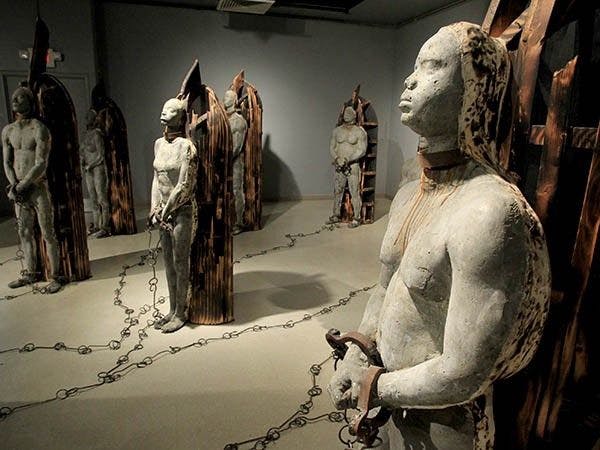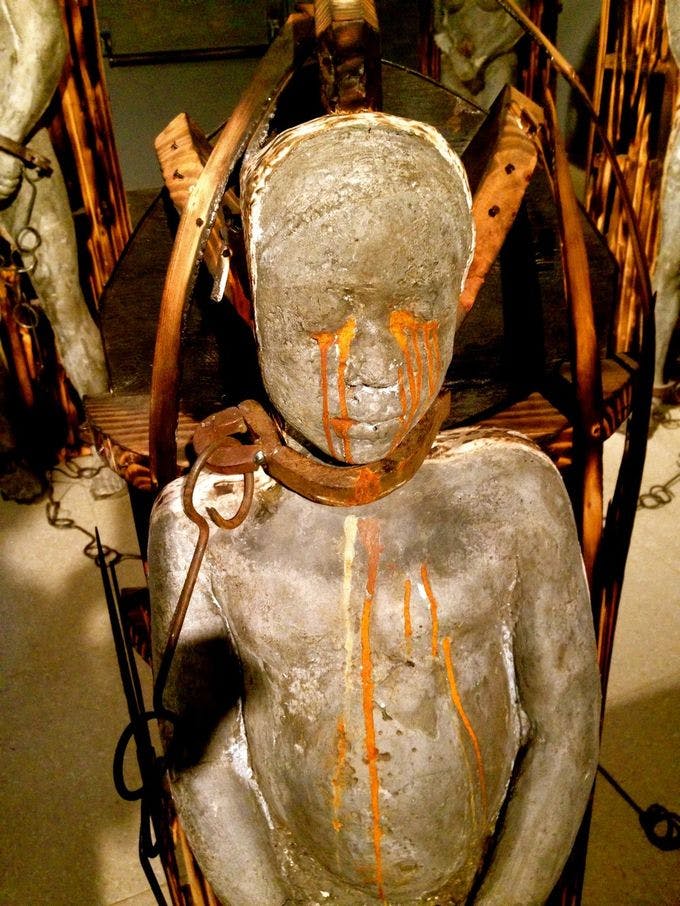Cash Crop: Slavery in America
H.R. 40 is meant to address “the fundamental injustice, cruelty, brutality, and inhumanity of slavery in the United States and the 13 American colonies between 1619 and 1865.”
by Susan E. Stutz

CHARLES FOX / STAFF PHOTOGRAPHER / Philadelphia Inquirer Stephen Hayes CASH CROP!
The Naked Truth
America was built with slave labor. What began with the first shipment of twenty slaves in 1619 would swell to more than 600,000 Africans who would ultimately land on our shores. That number would grow to more than 4,000,000 people who were enslaved in this country between 1619 and 1865. Their blood, sweat, and tears, as well as that of their descendants, are blended into the gravel that has paved our roads, the cotton that has clothed our bodies, and the steel that has built our skyscrapers. There is not an industry in present-day America that does not owe its existence, in no small way, to the bent backs of America’s slaves.
And, what did they get in return? Nothing. For that is what slavery is. Slaves were not enslaved people, they were livestock, chattel. They were ripped from their loved ones with no more thought than a farmer might cull a herd of cows. Women and girls were raped by their masters and then forced to bear children who would be born into bondage. They were beaten, and they were murdered, and they were disposed of as nothing more than yesterday’s garbage. They were a cash crop that was easily harvested and even more easily replenished.
Though slavery was abolished by the ratification of the 13th Amendment, the end of Reconstruction and the subsequent rise of Jim Crow and Black Codes strangled the promise of emancipation in its crib. These structures continued to keep freed slaves under the thumb of white America. If former slave owners could not own their bodies, they could still own their minds by dictating virtually every move African-Americans made in both their private and public lives.
White America is responsible. We are responsible. We do not get to hide behind the idea that the current generation is not responsible for the sins of the past. The buck stops — should always stop — at our feet as well as the feet of those who have come before and those who will come after. We have a responsibility to dismantle the yoke of slavery that continues to tighten around the neck of people of color in this land of the free. And, that means you too.

CHARLES FOX / STAFF PHOTOGRAPHER/Philadelphia Inquirer Stephen Hayes CASH CROP
Why?
Because the issue of slavery and the repercussions of that institution are keenly felt by every generation since slavery began. Though the physical bonds of servitude are gone, the emotional, financial, educational, and environmental chains remain. Slavery is ingrained in each and every corner of America. It is present in our schools that have become a pipeline to prison for children of color. It is alive and well in the drinking water that has poisoned our families and that could have been cleaned at a cost of approximately $80-$100 per day. It is built into the garbage dumps and toxic plants that are constructed in the areas surrounding low-income housing because the people who live there do not have the resources to fight city hall. It is inherent in the job application that values white Americans with felony convictions over people of color who are educated and devoid of a criminal history.
Slavery lives in America’s halls of justice as we charge, convict, and incarcerate people of color at alarming rates because with brown skin comes guilt. You can hear its roar in state Constitutions that include amendments which targeted freed slaves and tried (and in many ways succeeded) to make felons out of an entire people. It is there in the eyes of society that view people of color who require state assistance as leeches while seeing the white family next door as just getting a helping hand. Slavery rears its ugly head every time women of color are criticized and seen as reckless for having children, no matter how many, as they cry out for reproductive health care and are forced to watch the blockades to low-cost or free reproductive care being built before them. Slavery lives every time a woman of color is sexually assaulted but not believed when she calls for justice.
Centuries have passed and America has ignored the awful truth. We have swept it under carpets and barely given it a sideways glance in the education of our children. Slavery has become nothing more than a footnote in the annals of our history. Enough is enough. It is long past the time for us to face that abhorrent history and take steps to make amends. H.R. 40 Commission to Study and Develop Reparation Proposals for African-Americans Act may well be a meaningful step in that direction.
A Good Place to Start
Introduced by Representative Sheila Jackson Lee from Texas’ District 18, H.R. 40 is meant to address “the fundamental injustice, cruelty, brutality, and inhumanity of slavery in the United States and the 13 American colonies between 1619 and 1865.” If enacted, it will establish a commission of 13 individuals who will be chosen because of their educational background, specialized training, activism, and experience, especially in the area of African-American Studies and reparatory justice.
The Commissioners will have the responsibility of identifying what role our federal and state governments played in supporting the institution of slavery. And, that role is immense. Individual states and the federal government played a significant role in the establishment, encouragement, and furtherance of slavery. Slavery is at the heart of the 3/5 Compromise as well as being the “states-rights” issue that led to the Civil War.
The commission will seek to name the forms of discrimination in both the public and private sectors that were used against freed slaves and their descendants. Slavery was written into constitutions and codified into law. Following the Emancipation, constitutional amendments included felony disenfranchisement and crimes believed to be committed more frequently by freed slaves were written into criminal statutes.
It will also look to establish what lingering negative effects of slavery there are for today’s African-Americans and society. Because contrary to what Speaker McConnell suggests, the election of Barack Obama did not put racism to bed or silence slavery's echos across time.
The Commission will be empowered to hold hearings, request the attendance and testimony of witnesses, as well as the production of written materials such as books, correspondence, and other documents as deemed appropriate. The Commission will have the authority to invoke the aid of the United States District Court in issuing subpoenae in order to obtain such testimony and production. And, they will be permitted to call upon agency heads whom they believe may have information necessary to their investigation.

H.R. 40 has the potential to bring the brutality of slavery and its lingering effects out into the open once and for all. To drag it from dark and musty corners and say that this — the horrific actions that shackled both the minds and bodies of people who became property — is America’s legacy and she cannot hide from it anymore. It is not enough to say we are sorry for the sins of our forefathers. Actions speak louder than words ever will. It is time for America to meet the sins of her past head-on. Passing H.R. 40 is a good place to start.
What you can do
H.R. 40 is pending in the House Judiciary Committee’s Subcommittee on the Constitution, Civil Rights, and Civil Liberties. The Subcommittee’s members are Steve Cohen (D, TN), Jamie Raskin (D, MD), Eric Swallwell (D, AZ), Mary Gay Scanlon (D, PA), Madeleine Dean (D, PA), Syvia Garcia (D, TX), Veronica Escobar (D, TX), Sheila Jackson Lee (D, TX), Mike Johnson (R, LA), Louie Gohmert (R,TX), Jim Jordan (R, OH), Guy Reschenthaler (R, PA) Ben Cline (R, VA), and Kelly Arstromb (R, ND). If you live in one of the members’ states, send Congress to Resistbot and let them know your thoughts on H.R. 40.
If you live elsewhere, send Congress to Resistbot and ask your Representatives to support the committee members and encourage passage of H.R.40.
Haven’t used the ‘bot before? Resistbot is on Facebook Messenger, Telegram, and Twitter direct message. If none of those work for you, Resistbot also supports old fashioned SMS: text one of the keywords above to 50409 to get started. It takes 2 minutes to do something great.
Support the ’bot!
Upgrade to premium for AI-writing, daily front pages, a custom keyword, and tons of features for members only. Or buy one-time coins to upgrade your deliveries to fax or postal mail, or to promote campaigns you care about!
Upgrade to PremiumBuy Coins